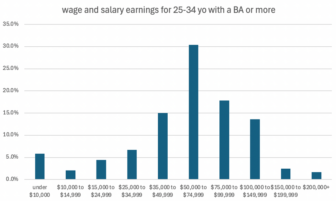Finally we are having the debate we need on higher education funding. For the past decade the state – on a bi-partisan basis – has disinvested in higher education without much debate. As we have argued for years this was a big mistake. In a world driven by globalization and technology, human capital is now the asset that matters the most to economic growth and prosperity. Quite simply the places with the greatest concentration of talent win!
Two recent events highlighted the philosophical gap on higher education. One was a hearing by the Senate Finance Committee on the Senate Democrats Michigan 2020 plan (worth checking out) that would substantially increase state investment in higher education. The other was the Business Leaders for Michigan higher education summit. (As I have written previously BLM getting actively engaged in pushing for a substantial increase in state appropriations for higher eduction is the most positive development in a decade.) Kudos to them!
Two quotes from the press coverage of the two events lay out clearly the differences on the role higher eduction plays in economic development. Senate Finance Committee chair Jack Brandenburg said as reported by MLive: “I don’t think the state can afford the $9,600 along with the personal property tax cut to manufacturers and small manufacturers,” he said after the session. “I think we really have to concentrate on getting the economy back on track.”
Contrast that to Patrick Doyle, Domino’s Pizza CEO in Crain’s Detroit Business: Doyle said that although unemployment is high in Michigan, talent is lacking, and that ultimately hurts jobs coming into the state. The conference will discuss how access to talent is a key factor in where companies base their operations. “The days of people simply chasing lower wages are really behind us, and companies need to know they can access the talent they need,” he said. “Growing that pool is critical to the long-term economic success of the state.”
Both understand higher education is important. But one sees it as a driver of economic growth, something you invest in to stimulate economic growth; the other as a luxury, something you invest in after the economy is growing. To us the evidence is clear: Mr. Doyle is right. Higher education is a driver of economic growth and must be a state economic development funding priority.
I had a chance to testify on this at the Senate Finance Committee hearing. Below are the two charts I presented. They tell the story rather powerfully. The first listing is the top 15 states in the proportion of adults with a four year degree or more. The second is the bottom 15. The bottom line: the higher a state’s college attainment rate the more prosperous all its citizens are, the lower a state’s college attainment rate the less prosperous all its citizens are. (Except for Wyoming, who’s prosperity is high energy prices driven.)
Maybe most encouraging is that the message that college attainment is an imperative if Michigan is once again going to be a prosperous state finally seems to be gaining traction. Two columns on the Senate Finance Committee hearing are worth reading. One by Jack Lessenberry in Metro Times entitled Senate dumbs down. The faulty belief that tax cuts are more important than producing more qualified graduates, the other by Chad Selweski in the Macomb Daily entitled Talent trumps tax cuts when creating new jobs.
|
State |
2010 college attainment rank |
2010 per capita income rank |
|
Massachusetts |
1 |
2 |
|
Colorado |
2 |
14 |
|
Maryland |
3 |
4 |
|
Connecticut |
4 |
1 |
|
New Jersey |
5 |
3 |
|
Virginia |
6 |
7 |
|
Vermont |
7 |
17 |
|
New York |
8 |
5 |
|
New Hampshire |
9 |
9 |
|
Minnesota |
10 |
10 |
|
Washington |
11 |
13 |
|
Illinois |
12 |
16 |
|
Rhode Island |
13 |
15 |
|
California |
14 |
12 |
|
Hawaii |
15 |
19 |
|
State |
2010 college attainment rank |
2010 per capita income rank |
|
Michigan |
36 |
39 |
|
South Carolina |
37 |
46 |
|
Ohio |
38 |
33 |
|
Idaho |
39 |
49 |
|
Wyoming |
40 |
6 |
|
Tennessee |
41 |
37 |
|
Oklahoma |
42 |
34 |
|
Indiana |
43 |
41 |
|
Alabama |
44 |
42 |
|
Nevada |
45 |
30 |
|
Louisiana |
46 |
28 |
|
Kentucky |
47 |
47 |
|
Mississippi |
48 |
50 |
|
Arkansas |
49 |
44 |
|
West Virginia |
50 |
48 |






